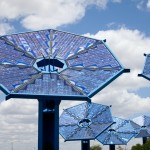What the Military is Learning About Energy Conservation

Photo by Ethan Miller/Getty Images
A Secret Service agent is seen at the largest photovoltaic solar plant in the United States where President Barack Obama delivered a March 21 speech about the importance of energy security.
Though the military’s energy initiatives aren’t new (the Army’s plan “Net Zero” facilities, like the one at Fort Hood, were signed off on in 2005), progress made over the past several years has been easing over into the private sector.
Last week, the Texas Coalition of Water, Energy, and Economic Security (TCWEES) hosted a legislative briefing featuring three military-affiliated specialists familiar with the energy conservation efforts of the Texas Army and National Guard.
Greg Kuhr is the Director of Facilities and Logistics at the US Army Installation Management Command. Colonel Tracy Norris is the Director of Construction & Facilities Management at Camp Mabry, and Brian Dosa is the Director of Public Works at Ft. Hood.
The three experts said that sustainable energy is a military priority. They hope to achieve “energy security,” which one panelist defined as “assured access to reliable supplies of energy and the ability to protect and deliver sufficient energy to meet operational needs.”
TCWEES looked to the military for guidance in energy conservation because of the military’s unique position at the forefront of the field. “The army is a stable costumer interested in long term investment,” says Kuhr, and that makes it easier to attract private investors.

Graphic courtesy Army Energy Program
This upside-down triangle represents the Army's "Net Zero" program goals. 17 bases were chosen to aim for either net zero waste, water, energy, or all three.
Through such partnerships — like one at Ft. Hood for photovoltaic panels — new technology can spread to the private sector and throughout other levels of the government. Col. Norris described partnerships between the National Guard and universities, state organizations like the Forestry Service, and local entities like the City of Bastrop.
This give and take with civilians is characterized in the army’s motto, says Kuhr. “The strength of our nation is our army, the strength of our army is our soldiers, and the strength of our soldiers are our families, thus ‘Army Strong.’”
Families at Ft. Hood pose one of the biggest hurdles in conservation. “If my teenage girls go in and turn down the air-conditioning and open up their windows, they can defeat everything I’ve invested in my house,” says Dosa. “It’s the same way with soldiers.”
Because Ft. Hood pays one bill for the entire complex — not individual buildings — soldiers aren’t necessarily motivated to personally conserve. So the Army’s taking a page out of the public’s book by instituting single-building metering and mock-billing.
Col. Norris also emphasized shifting mindsets. “The more the soldiers and the civilians working for the National Guard can understand,” says Col. Norris, “the more they can do best practices and behaviors to bring down the cost on some of the utilities.”
But the military is able to institute energy changes in ways that civilian organizations cannot. Dosa described a community at Ft. Hood spurred by new medical center. The homes of those that work in the center will be within walking or biking distance from it, and shops will be near the homes, minimizing families’ time spent in cars.
City planners don’t have the ability to exhibit such control, another element of what make’s the military a unique incubator for new energy ideas. As Tom Fitzpatrick, the moderator of the panel explained: “Institutions of the military do a fantastic job at organizational and technical problem solving, and are routinely successful at identifying problems developing and considering alternative solutions and communicating and executing plans.”
Kelly Connelly is an intern with StateImpact Texas.
